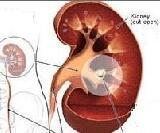Renal Urolithiasis (RU)
Kidney stones disease; Renal calculus; Nephrolith

Renal urolithiasis,also also known as kidney stone disease, is when a solid piece of material occurs in the urinary tract. Kidney stones typically form in the kidney and leave the body in the urine stream. A small stone may pass without causing symptoms. Most stones form due to a combination of genetics and environmental factors. Risk factors include high urine calcium levels, obesity, certain foods, some medications, calcium supplements, hyperparathyroidism, gout and not drinking enough fluids. Oxalate metabolism is considered to be almost identical between rats and humans. Thus, there are many similarities between experimental nephrolithiasis induced in rats and human kidney-stone formation, and a rat model of calcium oxalate nephrolithiasis can be used to investigate the mechanisms involved in human kidney stone formation.
Organism species: Mus musculus (Mouse)
- Disease model DSI562Mu01 Mouse Model for Renal Urolithiasis (RU) In Stock
- Disease model DSI562Mu02 Mouse Model for Renal Urolithiasis (RU) In Stock
- Disease model DSI562Mu03 Mouse Model for Renal Urolithiasis (RU) In Stock
- Customized Service n/a Tissue of Renal Urolithiasis (RU) (If Necessary) Tissue Customized Service Offer
- Customized Service n/a Serums of Renal Urolithiasis (RU) (If Necessary) Serums Customized Service Offer
Organism species: Rattus norvegicus (Rat)
- Disease model DSI562Ra01 Rat Model for Renal Urolithiasis (RU) In Stock
- Disease model DSI562Ra02 Rat Model for Renal Urolithiasis (RU) In Stock
- Disease model DSI562Ra03 Rat Model for Renal Urolithiasis (RU) In Stock
- Customized Service n/a Tissue of Renal Urolithiasis (RU) (If Necessary) Tissue Customized Service Offer
- Customized Service n/a Serums of Renal Urolithiasis (RU) (If Necessary) Serums Customized Service Offer
Organism species: Cavia (Guinea pig )
- Disease model DSI562Gu01 Cavia Model for Renal Urolithiasis (RU) In Stock
- Customized Service n/a Tissue of Renal Urolithiasis (RU) (If Necessary) Tissue Customized Service Offer
- Customized Service n/a Serums of Renal Urolithiasis (RU) (If Necessary) Serums Customized Service Offer
Organism species: Oryctolagus cuniculus (Rabbit)
- Disease model DSI562Rb01 Rabbit Model for Renal Urolithiasis (RU) In Stock
- Customized Service n/a Tissue of Renal Urolithiasis (RU) (If Necessary) Tissue Customized Service Offer
- Customized Service n/a Serums of Renal Urolithiasis (RU) (If Necessary) Serums Customized Service Offer
Organism species: Canis familiaris; Canine (Dog)
- Customized Service n/a Model for Renal Urolithiasis (RU) Disease Model Customized Service Offer
- Customized Service n/a Tissue of Renal Urolithiasis (RU) (If Necessary) Tissue Customized Service Offer
- Customized Service n/a Serums of Renal Urolithiasis (RU) (If Necessary) Serums Customized Service Offer


